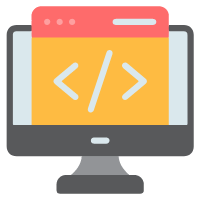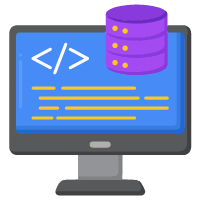Introduction – This is a 2 part blog series on the topic ‘Low-Code/No-Code Platforms’.
In the 1st part, we have focused on ‘Low-Code / No-Code: The Future of Business App Development.’
And in the 2nd part we will be talking about some of the ‘Best Low-Code / No-Code Development Platforms in 2023’
Even when you have an immaculate set of tasks in front of you, building an application could be a hectic process, and each and every low-code platform out there handles them differently.
You could either focus on a specific feature or try to look altogether for a set of new and advanced features.
In the end, you will require what actually matters to you.
So in this blog we are providing you with a list of Low-Code and No-Code Platforms to help you pick one according to your needs and preferences!
Types of No-Code Platforms
App/ Website Building
Building a website could be as difficult as building a complex application.
And it becomes important for this process to be much easier for small business users or enterprise level companies. This is where No-Code Tool’s powerful features come in handy to make the website building process a breeze.
Project Management
No-code tools are as important for project managers. It makes it easier for even non-technical users to handle projects and monitor their progress without using any code. All of this can be done by simply selecting a ready-made template to work with and within the tool you will be able to organise your resources, track schedules, and automate day-to-day tasks.
Automation
In a fast paced world where everything demands to be done right, quick and on time, (which at times or most of the time is humanly impossible), No-Code Automation acts as the key to meet these demands. No-code Automation Tools are here to stay in the long run as it differs from Automation in terms of maintaining task individuality for each and every person in a business setup.
Analytics
Analytics involves more than just creating reports and calculation, No-Code Analytics tools are built to make the process much easier with drag and drop components. With no-code centric platforms like Google Analytics and its large set of tools, you don’t have to subscribe to any of their premium plans to conduct business processes that are directly related to the analytics aspect.
No-Code Tools
App Website Building
Not to confuse CMS (Content Management System) with CRM (Customer Relationship Management), Hubspot CMS is beneficial for business owners to build websites, blogs, landing pages and any other form of content to manage and grow their businesses.
You get to choose from multiple templates and customise it with easy-to-use drag and drop features. Its responsive design is adaptable on all devices and will fit well with your current workflow. Hubspot CMS is something that you can give a try before asking developers to build landing pages for you.
Hubspot CMS
As a low code platform, Zoho Creator has a variety of templates you can choose to build Business Apps from. Its powerful features could be used to your advantage to get your custom app capture the top most position on Google Play Store or App Store! You can ask developers to use features like API Protocol, integrate with databases like SQL, data collection forms, data enrichment, workflows, dashboard, custom forms and serverless functions.
Zoho Creator
Project Management
Monday.com has the calibre to be your go-to project management tool as its features will stack you up with a to-do list, task prioritising, drag and drop components, assignment creation, management, and due dates. These features will help your team align their tasks and stay efficient by automating and streamlining these processes. Its intuitive user interface will make your project management tasks much easier as you can customise certain workflows and fields to your projects.
Monday.com
ClickUp is an ideal platform to keep track of your work. Its comprehensive dashboard will give you at-a-glance information and also act as a one-stop solution for task assignment, reminders or just making notes in the notepad. A no-code project management software like ClickUp also provides seamless integration with popular and widely used platforms which helps you automate the management of your projects in a smooth manner.
Click Up
Automation
Zapier is a great non-complex platform that is easy to learn and can help in getting so much of your work done in a less-hectic way. It can save you from a lot of headache as they are both cost and time effective. It integrates apps and tools in a way that performs specific tasks in an effortless way. One of its features that stands out the most is its ‘quick setup’ feature that provides you with seamless work experience.
Zapier
Juphy’s primary aim is to manage all of the interactions taking place on different social media handles like Google, Facebook, WhatsApp, Instagram, Youtube, LinkedIn, or more exactly, almost everything at the same time and place. It’s an efficient automation product as its clean UI doesn’t let you spend more than a second in accelerating your sales process by integrating various communication channels simultaneously.
Juphy.com
Analytics
Google Analytics is a small business friendly tool that has free yet advanced features to provide you with obvious Google-based data, to help you analyse the report and take effective actions to top the Google SERP. A great win if you think of it. It doesn’t just restrict to small businesses, Google Analytics 360 has even more advanced features that includes more than just reporting, data analysis and visualisation. It can also integrate with other Google Products like Google Ads and Google Search Console.
Google Analytics
Mixpanel is an effective tool for product managers as it helps in keeping track of product related analysis. The tool helps different departments to identify problems, make fast decisions and build remarkable products. It is easy to use and also has a cool feature of customising reports with its pre-built templates. It is currently working with more than around 26,000 companies, so maybe, you should try it too!
Mixpanel
Types of Low-Code Platforms:
General Purpose
Applications built with low-code development platforms can be deployable anywhere. By virtually creating an application we can meet a variety of requirements depending on the goal and setup involved in the making. It also involves developing the front-end and back-end of the application.
Process Based
Develop apps that run and monitor day-to-day business operations by maintaining workflows and integrating different systems with process based Low-Code Development App. Low-code Business Process Management is ideal for going paperless and enabling digital transformation of workflows and operations.
Request-Handling
These platforms are similar to process-based low-code but are only designed to process requests for fixed processes under professional developers.
Database
Database low-code platforms are great if you want to build apps that are data intensive and want data to be fed into a system hassle free without spending a lot of time on getting the task done with the help of its customisable dashboards.
Mobile Application Development Platform
Developers can now easily code, test and launch apps specifically built for mobile devices, smartphones and tablets with Low Code’s non complex, flexible features. With the help of this platform, developers just have to write code for any one mobile platform and then port the app to other different mobile platforms.
Low-Code Tools
Mendix is ideal for Startups and Agencies as it is one of the most customer-aware low-code platforms out there. It is not just great in terms of growth but also provides a fast and safe app development process. By updating its existing feature every month, Mendix helps you in automating, integrating and building applications. Plus, you also get the option to pick between low-code or no-code platforms as per your specific needs!
Mendix
Oracle Application Express is built to develop enterprise grade applications faster with less coding involved. Also known as APEX, it is one of the best low-code tools as it focuses on fast and safe application delivery. APEX is trusted by a large number of companies, be it small or enterprise level. So there is no harm in trying this one out!
Oracle
WaveMaker as a low-code platform consists of a four-step process which is to build, integrate, secure and deploy. Although the process is similar in almost all of the low-code platforms, Wavemaker ensures that each stage of the process has high quality features and components that leaves a good impression on large and small businesses. Also, it doesn’t completely turn out to be a no-code platform as it is ideal for developers to add custom code, which helps it earn extra points in terms of customer satisfaction and loyalty.
Wavemaker
Visual LANSA is one of the powerful low-code platforms out there that helps you build apps faster, it has a great ease-of-use and incredible customer services. You can rely on this platform and it’s internal tools for your coding requirements and also integrate with other systems all the while keeping it fast and simple.
Visual Lansa
Salesforce Lightning can help you in getting things done right, fast from the comfort of your home or office. Whether you are coding or relying on drag and drop components, Salesforce Lightning has got you covered. Along with team collaboration and app integration options it also has codes that are ready to use and has a smooth interface for an effortless graphical user interface experience and app building process.
Salesforce Lightning
OutSystems as a low-code platform has it all ‘figured out’ and functions similarly in a way how anyone might say, ‘gets straight to the point’. This is how users feel about the platform as its ease of use is similar to that of a no-code tool with its advanced key features and drag and drop option helping you get exceptional outcomes. It still has the very essence of low-code platforms as its unique features include single-click deployment and full-stack visual development. So a good amount of programming language is necessary as it is mainly designed for developers.
Outsystems
Appian is an excellent tool to automate business processes. It has everything you need to design, optimise and automate even the most complex processes, from start to end. Most renowned organisations trust Appian to revamp their workflows and optimise business operations, which results in better outcomes and improved customer experiences. More proof? It has also been named as the Leader by Gartner in 2020 for Enterprise Low-Code Application Platforms.
Appian
Claris Filemaker- also one of the best low-code platforms in the industry. By bringing together superior interfaces, features and customizability, it creates and integrates the apps you built like a cakewalk. Although it is important to remember, while it is low-code, you will still be required to know basic coding which is why citizen developers may struggle while using FileMaker. With its impeccable customer services, it also provides flexibility in customising your app.
Claris Filemaker
Conclusion
So by now it’s clearly evident that some low-code/no-code platforms are for everyone while others mostly cater to trained developers.
Which means you have a number of options to choose from, so take a good look at the list above, go ahead and know more about them on their website and pick the most ideal low-code/no-code platform for yourself!




















